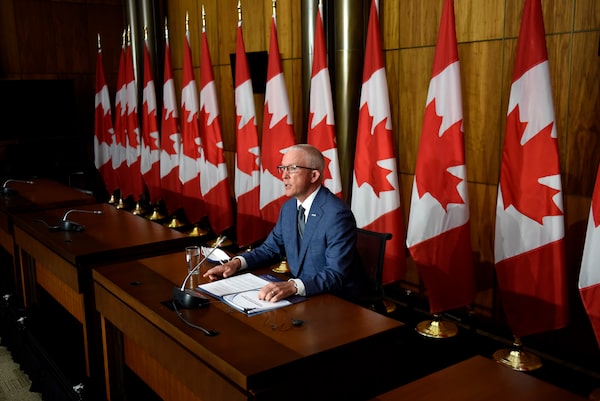
Gregory Lick, the National Defence and Canadian Armed Forces Ombudsman, speaks during a news conference after releasing a position paper on the ongoing misconduct crisis in the Canadian military in Ottawa on June 22, 2021.Justin Tang/The Canadian Press
The federal government and the military’s response to sexual misconduct in the Canadian Armed Forces has defied common sense and there has been zero accountability on behalf of political leadership when related complaints are brought forward, the Military Ombudsman says.
Gregory Lick, whose role is to serve as a neutral third party on matters related to the Department of National Defence (DND) and the Canadian Forces (CAF), said the issue of sexual misconduct has “moved from crisis to tragedy.” He made his remarks Tuesday at a media conference to accompany the release of a position paper on the path forward for his office.
Mechanisms designed to support survivors have failed, he added.
“The scandal has put on display a culture that insulates its bad actors and demands silence of its victims,” Mr. Lick said.
Mr. Lick’s comments come as the Canadian military faces a sustained controversy over sexual misconduct that has tarnished its image and prompted several commanders to step aside. Former Supreme Court justice Louise Arbour has been named to study the creation of an independent mechanism, separate from the ombudsman’s office and other parts of the military’s administration, to investigate complaints of sexual harassment and sexual assault in the Forces.
Lieutenant-General Michael Rouleau resigned last week from his role as second-in-command of the CAF after he and the commander of the navy went golfing with former chief of the defence staff Jonathan Vance, who is facing a military police investigation over allegations of sexual misconduct. Lt.-Gen. Rouleau said in a statement that he acknowledged the golf outing contributed to an “erosion of trust” in the leadership of the Canadian Forces.
The Military Ombudsman’s office reports directly to the Defence Minister. Mr. Lick said Tuesday that this is a problem because it can create a conflict for the minister, who wants to control the narrative around the DND and the Forces.
He said the minister, the acting chief of the defence staff and the deputy minister have, by their own admission, “failed to do what is required” to combat sexual misconduct in the ranks. Mr. Lick also said that strengthening his office’s mandate would be an indispensable part of the solution.
The negative effects of sexual misconduct on survivors, and on recruitment and retention in the military, risk threatening national security, Mr. Lick said. Action must be taken, he added.
In response to the ombudsman, Prime Minister Justin Trudeau said Tuesday that the government is working to address problems with military culture that have been pervasive for far too long, including its tolerance of misogyny and unacceptable actions.
Mr. Trudeau said that Ms. Arbour has been given the capacity to look at the entire situation and make concrete recommendations on how to move forward. He also pointed to the appointment of Lieutenant-General Jennie Carignan as the CAF’s new chief of professional conduct and culture. The DND has said it will ensure that steps are taken to act on any interim recommendations made.
Harjit Sajjan, the Minister of National Defence, said in a statement that he is committed to creating an independent and external reporting mechanism that meets the needs of survivors. He also said he is sure that Ms. Arbour will take a report from the ombudsman into consideration when making her recommendations.
The position paper released by Mr. Lick’s office on Tuesday calls for, among other things, the ombudsman to be given full structural and administrative independence from the DND. The paper argues the change is necessary so the office can carry out its functions unimpeded.
Three years ago, then-military ombudsman Gary Walbourne alerted Mr. Sajjan to a 2018 allegation of sexual misconduct against Mr. Vance. Mr. Sajjan declined to see the evidence and alerted his former chief of staff, Zita Astravas, who made the Prime Minister’s Office aware. The government said the PMO then referred the matter to the Privy Council Office, the department that supports the Prime Minister and the cabinet, but the office could not obtain further information. Mr. Sajjan has maintained that he acted appropriately when Mr. Walbourne raised the initial concern with him.
Conservative Leader Erin O’Toole, who has called for Mr. Sajjan’s resignation, said Tuesday that when the ombudsman described erratic behaviour on behalf of leadership, “it’s clear that he was speaking about the actions of Justin Trudeau, his senior staff, and Minister of Defence.”
NDP defence critic Randall Garrison said that the ombudsman’s remarks are in keeping with what his party has been trying to draw attention to: the government’s inability to take effective action against sexual misconduct in the military and its failure to act in the face of allegations about Mr. Vance.
He also said that Liberals blocked a report at the House of Commons defence committee on the issue of sexual misconduct in the military and Mr. Vance.
The Liberals released their own recommendations on Monday, including that the government should support military sexual trauma in the same way as other service-related injuries. Liberal MP Yvan Baker said by publicly releasing recommendations, members of his party had done “what we believe the committee should have done on a non-partisan basis.”
Know what is happening in the halls of power with the day’s top political headlines and commentary as selected by Globe editors (subscribers only). Sign up today.
 Kristy Kirkup
Kristy Kirkup